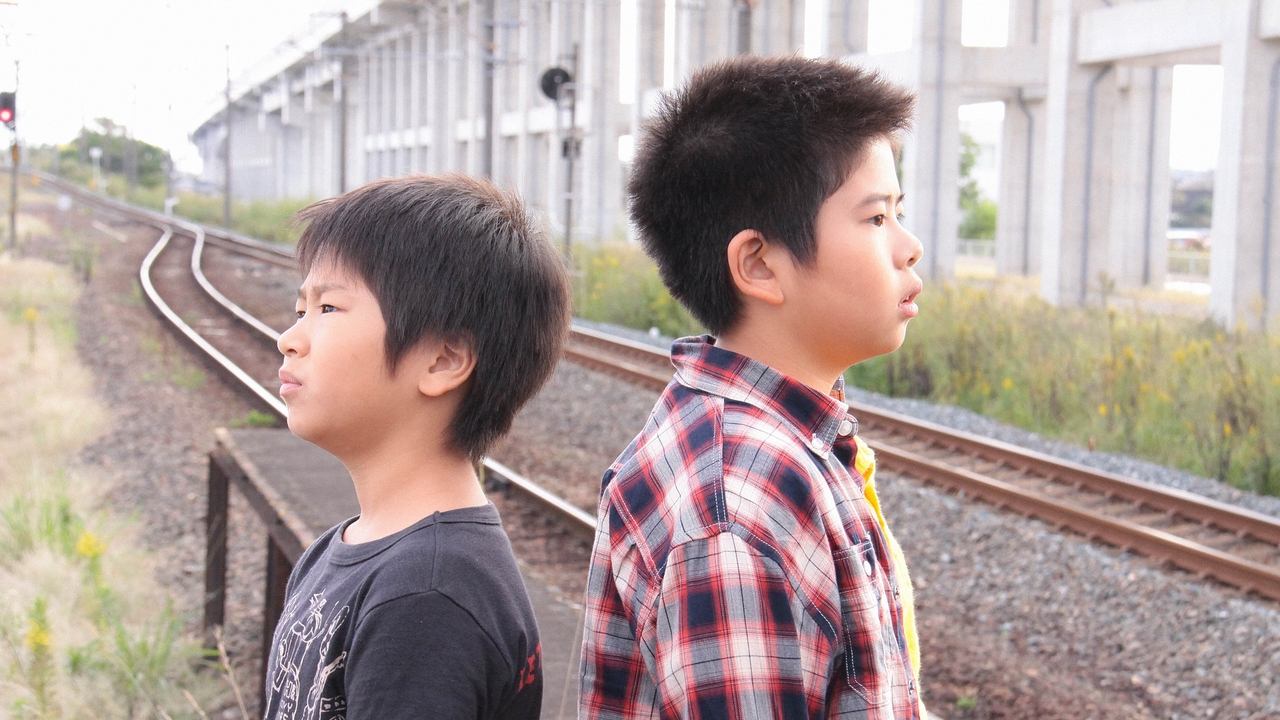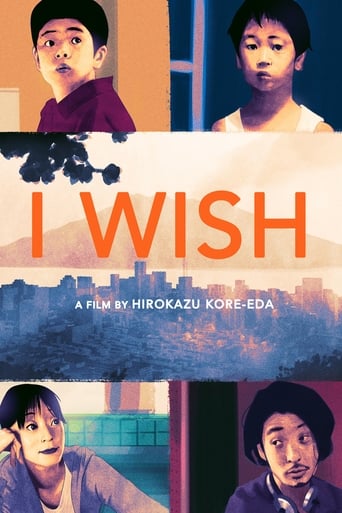Jeanskynebu
the audience applauded
Helloturia
I have absolutely never seen anything like this movie before. You have to see this movie.
Griff Lees
Very good movie overall, highly recommended. Most of the negative reviews don't have any merit and are all pollitically based. Give this movie a chance at least, and it might give you a different perspective.
Quiet Muffin
This movie tries so hard to be funny, yet it falls flat every time. Just another example of recycled ideas repackaged with women in an attempt to appeal to a certain audience.
asc85
As an American who likes Japanese cinema, as well as Koreeda films (Nobody Knows is one of the five best films I have ever seen, and I liked Like Father, Like Son), this film was a huge disappointment, and honestly, I have very few positive things to say about it. The main problem, as also noted by another IMDb reviewer, is that the film takes a very, very long time to set up the plot of the kids going to see the bullet trains intersect, and then when it goes into motion, everything feels super-rushed. At more than 2 hours in length, the pacing was completely off. This film could easily have had a half hour chopped off and it wouldn't have mattered.This Japanese coming-of-age film reminded me a lot of Rob Reiner's Stand By Me. But with the exception of the film's climax, there was very little to it.
jandesimpson
A group of children walking in an unfamiliar landscape stop to gaze in rapture at a garden full of colourful flowers. For a moment they seem to have forgotten the reason they have taken their journey; one lovely moment among many in Hirokazu Kore-eda's "I Wish," a meditation on how children would like their world to be that little bit better. The film has taken quite a while to reach this point. In a rather meandering exposition the elder of two brothers separated geographically by a family split comes to realise that his greatest wish is for them to be reunited again. He even wonders whether the smouldering volcano that dominates the town might one day burst, causing the mass exodus that could end in physical relocation and reconciliation. He paints a picture of the eruption, places it on a high point of his wall and gazes up at it from his bed. During the development that follows be excitedly learns that the passing of the two bullet trains on a newly constructed line joining his town and his brother's generates at their point of passing a force so powerful that anyone standing beside the track will have their wish come true - the very stuff of fairy tale here translated into a realistic contemporary setting. When both brothers gather together a few friends to make their collective wishes come true what has until then been a rather slow footed film cluttered with non-essentials suddenly springs to life. The two groups travelling from their two towns towards each other on their local line meet up at a country station. From this point there is magic in the storytelling. What I admire most about Kore-eda is his honesty. In real life not every wish can come true but every so often there can come about a coincidence that can in itself be something of a miracle. Here it takes the form of the children's chance encounter with very human "good fairies." the elderly couple who see in one of the girls a resemblance to a daughter whose company they no longer enjoy. This is just enough to get the children to the one place where they can be close enough to the bullet trains to scream their wishes. The rest of the films is the quietest of codas as the children return home with perhaps a wiser view of the world than when they set out.
Howard Schumann
As a result of their parent's separation, 12-year-old Koichi (Koki Maeda) lives in Kagoshima with his mother (Nene Ohtsuka) and grandparents (Kirin Kiki and Isao Hashizume) while his younger brother Ryunosuke (Oshiro Maeda) lives with his intermittently employed musician father (Jo Adigiri) in Fukuoka. Both talk to each other daily on their cell phone but have not seen each other in six months. Acclaimed Japanese director Hirokazu Koreeda's I Wish is a comedy/drama about the consequences of a split family and of the children's longing to reunite them. In contrast to Nobody Knows, an earlier Koreeda film about children, I Wish will not break your heart. The brothers (brothers in real life as well) are very different in personality but both seem happy and well adjusted in spite of the difficult circumstances of their life. Ryu is fun loving and his toothless smile will warm your heart. Koichi is more serious and thoughtful but very engaging. He becomes elated when he hears that a bullet train is coming that will connect his city to his brother's. Even more exciting are the rumors that are floating around that when two trains pass each other in opposite directions, your wishes will come true out of the energy the trains create. Koichi's wish is for the nearby volcano to explode so that his family will have to move, and he will be reunited with his brother.The plan is to meet his brother half-way and do some serious wishing. The fun starts when they have to find creative ways to raise the money. There's also the pesky part about Koichi and his two friends leaving school in the middle of the day. For this he recruits his grandfather to provide an excuse to the school authorities and includes the school librarian who once had a similar experience of wanting to escape from school to attend a concert.The group of friends of both brothers adds a lot to the film as well. Tasuku (Ryoga Hayashi) wants to marry his teacher, a bit of magic realism there. Makoto (Seinosuke Nagayoshi) wants his dog to come back to life. Megumi (Kyara Uchida), much to her mother's indifference, wants very much to go to Tokyo and become an actress. Kanna (Kanna Hashimoto) wants to be a better painter, and Rento (Rento Isobe) wants to be a faster runner. While the focus of the film are the wishes of the group of children and their trip to the trains' midpoint, the film also provides a rounded portrait of all of its characters without syrup or other sweeteners, though it certainly views children through a somewhat rose-colored lens.I Wish is a charming and lighthearted film, though its over two hour's length can makes the goings-on a bit tedious. Although the children arrive at the point of realizing that accepting what is can produce happiness, the growth in reaching that point is what the film is about. Ultimately, however, though hoping, wishing, and yearning are all part of childhood, some adults come to realize that, a step beyond wishing and hoping and praying for something to happen, is our ability to create, to make things happen. Unfortunately, most people have not gotten past the hoping stage.
Ben Smith
Lighthearted but profound Japanese family drama about two young brothers forced to live apart after the separation of their parents. The more sensitive Koichi (Koki Maeda) lives with his mother and grandparents in Kagoshima under the shadow of the active Sakurajima volcano, while the happy-go-lucky Ryu (Ohshirô Maeda) has remained in Fukuoka with their slacker musician father. Koichi longs for them to be reunited and when he hears of a magical rumour that when two super-fast Bullet trains pass each other they create enough cosmic energy to grant your wish, he and his friends set out to put things back the way they were.The suburban tale of a troubled family told with a touch of fantasy and adventure draws obvious parallels with Spielberg, and it is more than worthy of the comparison. Director Hirokazu Koreeda elicits two incredibly natural performances from the boys (real life brothers) and indeed all of the young cast – in the scenes where they're hanging out he has seemingly turned the camera on some local school friends, their relationships seem so genuine. Koichi and Ryu's story is interspersed with those of their friends and family, all of whom have their own struggles and aspirations. Be it their grandfather's desire to bake a successful sponge cake, or Koichi's friend's dream of marrying the beautiful school librarian, every character – no matter how minor – is portrayed as a real person with their own hopes and fears. As a result it is constantly engrossing, establishing an affinity with everyone on screen and also allowing some fantastically warm funny moments to emerge from the characters themselves. Despite its concentration on character over narrative, and its general unpredictability, the film still has a mainstream tone and is more than capable of cultivating a wide, varied audience.A quiet natural film that avoids obvious melodrama and sentimentality, it retains a thoughtful depth about what it is to dream and hope for that which is just out of reach. As is often the case with the most affecting cinema its power lies in what the viewer brings to it from their own lives, and how much they are willing to invest in the film. With no obvious moral or message, it has the potential to be interpreted in many ways. A philosophical yet thoroughly accessible film that effortlessly gets under the skin.

